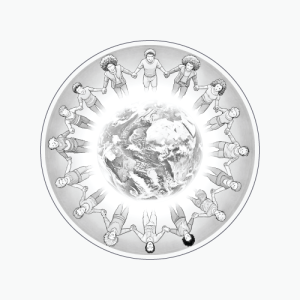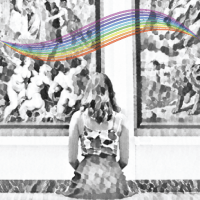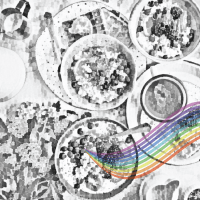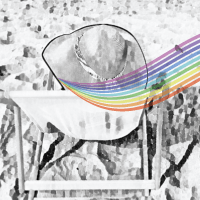
creating the family you need
Adult Adoption
- Atilla Tiriyaki
- Average Reading Time: 7 minutes
- Community, Special Groups, Youth
- articles, atillat
Adolescence is an important period in anyone’s life, from the physical changes we go through to the start of understanding ourselves better, all as we transition into adulthood. During this transition, many within the LGBTQIA+ community become much more aware of their sexuality, gender identity or both. Though attitudes worldwide are becoming more progressive, many young adolescents still face the real risk of rejection by their families simply for accepting who they are and wanting to live their true and authentic lives.
The problems are increased given the growing trend worldwide, where large numbers of people are having children much later in their lives. These factors create the real risk that many young people could become alone and adult orphans at a critical time in their lives.
A family is much more than a bloodline or genealogical connection; specific elements are essential for a family to be effective. Key components such as the emotional connection and bond families share and have for each other play a crucial role. Each member plays a vital part within the family unit. The older members offer guidance and support to the younger members, who, in turn, provide insight into an ever-changing world. As members of the family age, the younger members offer more support to those more elderly.
The simply reality is that being part of a family gives people a sense of belonging. It provides a strong support network of caring people and a framework for every family member to follow for the rest of their lives. You are typically born into a family, but what do you do if you are alone? And is adoption even an option as an adult?
The term adoption relates to the legal process of taking responsibility for another person, usually a minor (someone under the age of 18). Anyone over 18 is typically classified as an adult in most countries, which means they can adopt and take legal responsibility for another person. Whenever a person adopts a minor or adult, they agree to accept responsibility financially and emotionally for the adoptee for the rest of their lives.
Though the legal obligations change when minors they adopt become adults, there are still legal implications, which will vary by country, typically in matters such as inheritance, medical decision-making, and even access to grandchildren. Adopted individuals, adults, and children have the same legal rights, protections, and privileges as biological children in nearly all countries worldwide. For most countries, the ability to adopt stops when an individual becomes an adult; however, adult adoptions are legally permitted in- Canada
- Germany
- Japan
- Spain
- United States of America (USA)
According to research carried out by UNICEF, it is estimated that there are over 153 million children under the age of 18 that are orphans worldwide. Most countries are also seeing a common trend in which people have children much later in their lives and the rise of one-child families. With an average life expectancy of 77 for adults, all contribute to the risk that someone in their 20s and 30s is more likely to become an adult orphan, all alone at an important time in their lives.
The problem is further compounded for many within the global LGBTQIA+ community. Today, people still face the reality and risk of being rejected and disowned by coming out to family members. According to research carried out by the Family Acceptance Project (https://familyproject.sfsu.edu/news-announce/family-rejection-lesbian-gay-and-bisexual-adolescents-negative-health-outcomes), they found that:- Higher rates of family rejection during adolescence were significantly associated with poorer health outcomes for LGB young adults
- LGB young adults who reported higher levels of family rejection during adolescence were 8.4 times more likely to report having attempted suicide, 5.9 times more likely to report high levels of depression, 3.4 times more likely to use illegal drugs, and 3.4 times more likely to report having engaged in unprotected sexual intercourse, compared with peers from families that reported no or low levels of family rejection
- Latino males reported the highest number of negative family reactions to their sexual orientation in adolescence
Young, alone, and at a crucial stage within their lives, it is understandable why many long for loving and caring family units. So, in the absence of any biological family, many may look to form one themselves with like-minded and caring people they meet along the way. Families we create is not a new concept within the LGBTQIA+ community; however, they are usually informal arrangements. If a newly formed family group wanted legal recognition, what are the implications when things become official?
In countries such as the USA, adult adoption was historically used by a small group of people from the LGBTQIA+ community. Though this approach was used by a few same-sex couples, especially those with a significant age gap, this route was rarely used amongst the wider community. However, it was still presented an opportunity and option for some. Adult adoption, at that time, may have offered some form of legal protection before same-sex marriage legislation was implemented. Adopting a loved one gave their partner rights and protection under the law; however, it also created problems, the most significant issue relating to the nature of the relationship.
When a person adopts, even an adult, the adoptee has the same rights and legal recognition as biological children. Even though all those involved are in a consensual sexual relationship, they effectively break the law by being physical with one another by committing incest. With the barriers relating to same-sex marriages now no longer a problem in many countries, the route of adult adoptions for this purpose would no longer need to be used to obtain legal recognition for their partner.
Adult adoption today has many merits, especially for those in long-term, loving friendships and when it comes to beneficiaries and next of kin. One such example is when visiting a person while they are in hospital. Rules vary by country and hospital; however, visitations are often only open to close family members. Even though the person may be the closest thing to family, they would not have any visitation rights (some hospitals are likely more flexible in certain situations).
In difficult life and death situations, partners and family members are often asked to make decisions regarding a person’s care or end-of-life requirements. Biological family members might be asked to make decisions without a legal next-of-kin in place even though they have been estranged and apart for many years. People that are alone, those who have multi-generational friends, especially where there is a close bond, could obtain legal recognition for those they consider family.
Adoptees have the same rights as biological children. Adult adoptees would be able to handle a person’s affairs, from legal to medical matters, as well as entitlements to their finances and estate. Not only financial or legal advantages, but for foreign nationals, many would be able to apply for citizenship based on their adopted parents’ residency rights. Adult adoptions can offer many benefits but at the same time present many risks. The main risk being that of exploitation and abuse by unscrupulous people looking to take advantage of vulnerable people in desperate situations.
You do not need to be blood relatives, adopt or become adopted to create a family. You only need a group of people who care for one another and cannot even imagine not being part of each other’s lives. The families you create can help combat loneliness, give people a vital support structure, as well as a group of people to celebrate holidays with, and so much more.
Adoption is an option but can be complicated and open to abuse by some of those involved. Not all countries allow adult adoptions, and those countries where it is permitted likely have unique requirements and criteria.
Adult adoption is a route that will not suit all people; however, the most important thing is to be surrounded by people you care for and who care for you. People that support, guide, and look out for your interests and love you for who you are unconditional. Family is much more than just bloodlines and genealogy. No matter your situation, remember you are not alone, and there are people out there who care for you; you just might not have met them yet






























